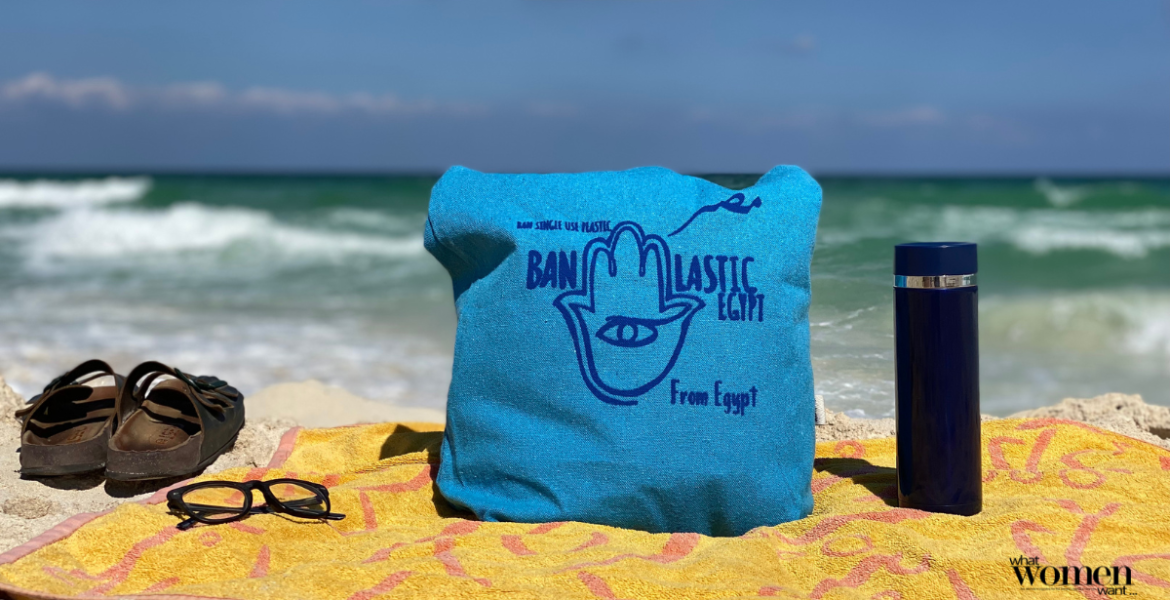Banlastic, the Alexandrian organization at the forefront of Egypt’s environmental revolution, stands as a beacon of hope in the fight against plastic pollution. The organization is founded by a passionate trio of activists driven by a shared vision for a cleaner, greener future. Banlastic has emerged as a catalyst for change in Alexandria and beyond. Through innovative initiatives, community engagement, and commitment to the environment, Banlastic has garnered a diverse base of supporters. They have ignited the movement to banish single-use plastics from Egypt’s coastal gem. Banlastic’s multifaceted approach has garnered widespread acclaim. In fact, it inspired individuals to embrace sustainable practices and advocate for policy reform. In the heart of Alexandria, Banlastic’s tireless efforts resonate.
The beginnings of Banlastic:
The idea of Banlastic started in the bustling streets of New Delhi, India. Manar Ramadan, co-founder of Banlastic, was a student pursuing a master’s in sustainable development. It was there, far from her hometown Egypt, that the seeds of Banlastic were sown. Ramadan’s recalls, “It is pretty well known that India is very advanced when it comes to the environment and technology, compared to Egypt, although they have the same conditions as we do.” Returning to Egypt in 2018, Ramadan was discouraged by the lack of initiatives addressing plastic pollution.
“ No organization or institution was working on banning single use plastic. In fact, there were very few Environmental organizations and intuitions, and they would mention plastic in between the lines.”
“We wanted to begin with an awareness workshop, but we realized then without alternatives they would not be useless. So we said, let’s start developing the first alternative product to single use plastic in parallel to the workshops.” Ramadan explains. So, Banlastic’s journey began, marked by a series of workshops, beach clean-ups, and advocacy campaigns aimed at fostering a culture of environmental responsibility.
Banlastic’s message:
Banlastic’s message is clear: environmental awareness precedes policy change. She explained that new policies would not have any effect without the proper societal awareness to implement. Ramadan said, “Policy makers change policies when there is awareness, not the other way around.” Also, they want to change the narrative around environmental conversations. They want to shift from the idea of that the environmental cause is a luxury to a dangerous issue that endangers society’s wellbeing.
27 Walks and Talks:
Among Banlastic’s notable achievements is the “27 Walks and Talks” campaign, held during the COP. This multifaceted endeavor included 27 events related to the environment in different fields. Ramadan explained, “We did school workshops, youth workshops, bootcamps, beach clean ups, marathons, and so many others.” All these events ended in an exhibition that included art pieces to raise awareness about environmental issues in the Jesuit Center. The exhibition lasted for 12 days parallel to the 12 days of the COP.
“The COP was happening in Sharm El Sheik and the closing exhibition was happening in Alexandria. It included outputs of artists that worked to document environmental problems happening in Egypt from plastic pollution to the effects of the water shortage on farmers.”
CAPMED:
At the heart of Banlastic’s outreach is CAPMED. It is an initiative harnessing the power of art to amplify environmental advocacy. This event is considered to be the 2nd edition of “Art For Climate”, which used art to amplify conversations about environmental issues. Ramadan explained, “When we do workshops or beach clean ups, we only get people who are interested in the climate. But we want to reach more people, and nothing gathers people more than art.” This year Banlastic wants to focus more the effect environmental causes have on people rather than the actual problems. She clarified, “We want to give a voice to people who are affected by environmental causes who do not have the ability to go to conferences or have social media.”
This year, Banlastic introduced four distinct tracks to CAPMED. It encompasses comics, creative writing, podcasts, and models, alongside short films. These tracks serve as avenues for participants to explore their creativity and express themselves. As the program culminates, the short films produced will be showcased at Alexandria Green Film Festival. It will showcase the talents of filmmakers who were part of the initiative. Also, they are extending an open invitation for other artists to contribute to the program. To celebrate the culmination of their efforts, there will be an exhibition featuring the outputs from all tracks. In doing so, it provides a platform to appreciate the multifaceted expressions of participants.
Communities Effort:
Volunteerism lies at the heart of Banlastic’s success. “We get many requests to volunteer. We have a team of people who work full time, but we have over 30 regular volunteers.” Ramadan reveals. They also have a growing community of over 1000 volunteers spanning across Mediterranean towns. One of their most popular actives is beach clean ups. She stated, “When we do beach clean ups, our goal is more than cleaning the beach. We want to raise awareness. It is to create a conversation with the participants or the other people sitting on the beach.”
As Banlastic continues to spearhead Egypt’s environmental movement, Ramadan remains steadfast in her commitment to a greener, cleaner future. She emphasis the importance of being mindful in our daily practices and consumption habits. It begins with a conscious effort to support local businesses when making purchases. Not only for the sake of bolstering the local economy, but also in reducing our carbon footprint. Considering the vast distances goods travel, particularly when imported from afar like the US. Each purchase entails a significant amount of carbon emissions. So, opting for products with minimal packaging and utilizing eco-friendly alternatives like reusable bags and refillable water bottles become imperative steps in mitigating our environmental impact. It is the collective effect of these small yet deliberate actions that contributes to a more sustainable way of living.





